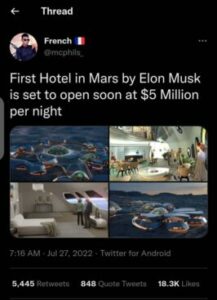Full Text
The social media space has been awash with reports that the world’s richest man and founder of SpaceX, Elon Musk, is set to unveil his latest investment, a hotel, in Mars. The story was also widely published by several blogs.
According to the reports accompanied by some images of the alleged hotel, a night will cost a whopping sum of $5 million.
Verification
Preliminary findings reveal that the claim originated on Twitter. An individual with the user name, French, tweeting via the handle, @mcphils_, had tweeted on the morning of July 27 with the caption, “First Hotel in Mars by Elon Musk is set to open soon at $5 Million per night”. The tweet had garnered over 5,000 retweets and 18,000 likes as of the time of filing this report.
The post was also circulated widely on Facebook by African Report Files, Rockreal TV, and UGANDANS AT HEART COMMUNITY.
Previous claim by Musk
In 2020, Musk had claimed that SpaceX will put a million people on Mars by 2050. His calculations relied on having Starship conduct around three flights a day and therefore approximately 1,000 flights a year.
He had previously outlined plans for colonisation of Mars, with his Mars Base Alpha initiative.
Little is known about this project with very few available details but photos released by Musk in 2018 show landing sites for the Falcon Heavy rocket as well as large dome-like structures. It appears to be powered by a vast solar farm.

About Mars
According to the National Aeronautics and Space Administration (NASA), an independent agency of the US federal government responsible for the civil space programme, aeronautics and space research, Mars is the fourth planet from the Sun – a dusty, cold, desert world with a very thin atmosphere. Mars is also a dynamic planet with seasons, polar ice caps, canyons, extinct volcanoes, and evidence that it was even more active in the past.
Mars is one of the most explored bodies in our solar system, and it is the only planet where rovers have been sent to roam the alien landscape. With a radius of 2,106 miles (3,390 kilometers), Mars is about half the size of the Earth.
From an average distance of 142 million miles (228 million kilometers), Mars is 1.5 astronomical units away from the sun. One astronomical unit (abbreviated as AU) is the distance from the Sun to the Earth. From this distance, it takes sunlight 13 minutes to travel from the Sun to Mars.
Mars is home to the largest volcano in the solar system, Olympus Mons. It’s three times taller than Earth’s Mt. Everest with a base the size of the state of New Mexico.
On-site investigations have been performed on Mars by the Viking landers, Spirit and Opportunity rovers, Phoenix lander, and Curiosity rover. Evidence suggests that the planet was once significantly more habitable than it is today, but whether living organisms ever existed there remains unknown.
Exploration
Dozens of crewless spacecraft, including orbiters, landers and rovers, have been sent to Mars by the United States, the Soviet Union, Europe, India, the United Arab Emirates, and China to study the planet’s surface, climate and geology.
As of today, Mars is host to 14 functioning spacecraft; eight are in orbit: 2001 Mars Odyssey, Mars Express, Mars Reconnaissance Orbiter, MAVEN, Mars Orbiter Mission, ExoMars Trace Gas Orbiter, the Hope Orbiter, and the Tianwen-1 Orbiter.
Another six are on the surface: the InSight lander, the Mars Science Laboratory Curiosity rover, the Perseverance rover, the Ingenuity helicopter, the Tianwen-1 lander, and the Zhurong rover.
The Rosalind Franklin rover mission, designed to search for evidence of past life, was intended to be launched in 2018 but has been repeatedly delayed, with a launch date pushed to 2024 at the earliest. The current concept for the Mars sample-return mission would launch in 2026 and feature hardware built by NASA and ESA.
Several plans for a human mission to Mars have been proposed throughout the 20th and 21st centuries, but none has come to fruition. The NASA Authorization Act of 2017 directed NASA to study the feasibility of a crewed Mars mission in the early 2030s; the resulting report eventually concluded that this would be unfeasible.
In addition, in 2021, China was planning to send a crewed Mars mission in 2033.
Conclusion
Having searched through the available evidence, Daily Trust can confirm that the posts and reports claiming that Elon Musk will soon open a hotel in Mars for 5 million dollars per night is false and misleading. So far, no proof exists of life on the red planet, popularly known as Mars. Also, Musk did not make such claim in recent times.




















